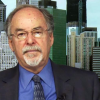At their virtual Saturday morning town hall on Colorado’s COVID-19 response, state Representatives Meg Froehlich (D-Littleton) and Tom Sullivan (D-Centennial) were joined by Colorado Treasurer Dave Young in explaining how Colorado will address serious budget shortfalls caused by the COVID-19 crisis.
But there wasn’t much cause for optimism, as deep budget cuts will be the top order of business when the state legislature reconvenes May 18.
“Our number one job that first week in the House will be starting in on the budget with the knowledge that the COVID crisis has pretty much devastated” it, Froehlich said.
She said the legislature will be shaving between $1 billion and $3 billion off the state’s current general fund budget of about $13 billion.
“I never had to work in an environment like this, where so much was being cut from the budget,” said Young, who was on Colorado’s joint budget committee for four years beginning in 2014.
“It is a difficult job, and I’m sure sorry I’m not on the joint budget committee now,” said Young, a Democrat.
But Colorado’s financial issues are not new.
“The state of Colorado never recovered from the 2008-2009 downturn, and the evidence of that is the [budget stabilization] factor,” Young said.
Siphoning Money From Schools
“When we had our last recession in 2008 and 2009, we created a budget stabilization factor… which was the money we should have appropriated to schools [due to constitutional requirements] but which we just absolutely couldn’t,” Froehlich said.
Since 2009, millions of dollars have been diverted from Colorado’s K-12 funding to address gaps in other parts of the state’s budget.
These annual appropriations peaked at over $1 billion in the 2012-2013 fiscal year, but came down to roughly a half a billion dollars in the 2019-2020 fiscal year.
Young said the mechanism has not maxed out yet. Therefore, he expected that K-12 funding will continue to be siphoned off for the foreseeable future.
At one point, Sullivan drew a comparison between his own family’s finances and the state’s.
“We have over the years been able to put together a rainy-day fund,” he said. “We have extra money that we’ve set aside in case the washer goes out, the car needs brakes, somebody needs a brand-new suit because they’ve been elected to office.”
Young said Colorado has nothing like that.
“We’re actually the only state in the nation without a rainy-day fund,” Young said, “and it’s because… we have this inability to save when we have extra revenue.”
In Colorado, he said, state legislators “are forced by the TABOR amendment in the constitution to return that revenue to the people.”
Young took no ideological issue with returning excess tax revenue to Coloradans, but he said it should only be done if the state has enough cash on hand for an emergency and can adequately fund its essential functions. He said neither of those conditions has been met.
He hoped that voters would back the implementation of a rainy-day fund or even amendments to TABOR.
Backfilling and Federal Funds
Young said, “it’s tough sledding right now,” given the state’s lack of cash on hand, an expected drop in tax revenue and the present inability to backfill holes in the state budget with federal COVID-19 relief money.
“I hate to always be looking to the feds,” Froehlich said, “but the fact of the matter is… they’re really the only ones that can pump money into the system in a way that the state just can’t.”
Colorado has received a good deal of money from the federal government to aid in its COVID-19 response, but there are strict limitations on how it can be spent.
“The money from the federal government, at the moment, is only for expenses that occurred from March until the end of this year,” Froehlich said, and “cannot be used for budget backfill.”
Furthermore, the federal government’s decision to move income tax filing day back three months meant that “revenue we would have expected to see coming in now isn’t coming in,” Young said.
Young has taken a leading role in a coalition of state treasurers lobbying the federal government to both mitigate the consequences of this rescheduling and re-think the strict guidance surrounding COVID-19 emergency funds.
Expectations
“Everybody’s going to get a haircut in this budget,” Froehlich said, “and my hope is that federal money can be directed to take care of some of these challenges.”
As Froehlich explained, there are many sectors of the already very lean state budget – like public safety and healthcare – which are rigid, in that any further financial stress on them could hamper the state’s short-term functionality.
She said this has led legislators to search for softer targets in the budget, like transportation and education.
“We’re in a crisis now and we have no real capacity to tap into resources, which is what forces us to make such dramatics cuts,” Young said. “I think people expect certain resources and certain services to be delivered, and they’re not going to see that.”



